The protagonist, Paul Baumer is a young man who enlists in the German Army of World War One. He joins the war with youthful enthusiasm, but once he is sent to the front, his motivations expire. Throughout the story, Baumer and his comrades are referred to as a number of things, for example, "Iron Youth," "Old Folk" or "Veterans." They earn these names because they have spent equal time in the war as everybody else, yet they are much younger. As Baumer struggles to survive the war, he is transformed from the young man he once was, into a ruthless killing machine. The war has stolen Baumer's innocents, as well as his youth.
In the beginning of Chapter 2, in the first paragraph the protagonist, Paul Baumer says,........i cannot comprehend it anymore. Our early life is cut from the moment we came here, and that without us lifting a hand.....
The author of All quiet on the Western Front, Remarque clearly suggests through Pauls thoughts, outlining the consequences of war.
Already in the first paragraph, the author gives an impression to the audience of a major theme of the novel, the effects of war, whether this may be a positive aspect or negative.
The author implies that war has inevitably destructed the youth of those young soldiers, it has made them into men, however given that they are still young and still pursues signs of youth, This is the use of paradox in this scenario which indicates the author's beliefs that War can severely impact on the youth.
This point is further enforced on page24,.......when we went to the district commandment to enlist we were a class of twenty young men, many whom proudly shaved for the first time before going to the barracks......
In the beginning the soldiers see war as an adventure,.......we have no definite plans for the future. Our thoughts of a career and occupation were yet too unpractical a character to furnish and scheme of life. We were still crammed full of vague ideas which gave to life and to the war also an ideal almost a romantic character......
Characterisation is an important aspect of the novel as we see these ideas are being developed from Baumers point of view. Rather than telling the reader what the author believes in war, the author establishes these ideas through Baumers, thus making it more engaging to read. We see the war giving young people a chance to live their dream rather than finding an unnecessary career path. The author also creates the thought that the youth does not know the meaning behind war; they do not understand the results of war as we will see in further chapters of the novel. This understanding also suggests the war maturing the youth, the changes in the simplified view of war becomes much broader as the 'Iron Youth' begins to see the downside of war (this was seen during Kemmerich's death).
The use of contrast as seen on page 29, again reflects on the positive side of war right after Baumer points out the mental and physical effect of war,......we became hard, suspicious, pitiless, vicious, tough and that was good; for these attributes were just what we lacked.......
Remarque's use of contrast suggests a hint that the soldiers are still confused on whether the war is good or bad. Paul Baumer may possibly be weighing the different aspects of war and determining what the war has become.
Furthermore Baumer believes that is it 'comradeship' which becomes the prize of entering war. Nonetheless, this comradeship is torn when soldiers die on the battle front. An example was when Kemmerich dies with an amputated leg.
Kemmerich cries on his death bed on page 32, the author depicts the image of tears running down his cheeks but Baumer does not wipe them away because his handkerchief is dirty.
The tears symbolises the depression that will emerge in future chapters of the novel while Baumer not being able to stop the tears represents that there is no going back, once entering the war entering, menace will strike. The main menace shown here is the death of soldiers.
.....outside the door I am aware of the darkness and the wind as deliverance. I breathe as deep as I can, and feel the breeze. I breathe as deep as I can, and feel the breeze in my face, warm and soft as never before, thoughts of girls, of flowery meadows, of white clouds suddenly come into my head.....
Remarque uses imagery to strongly suggest the major theme of this novel; that war is brutal and it destroys even those who physically survive. In this passage, Baumer imagines the end of war, the thought of flowery meadows and white clouds represent peace.
Baumers narration of the novel generally uses the pronoun, 'we.' We assume this technique is used by Remarque to show comradeship. It is the horrors of war which unites the soldiers together in a way that civilians cannot comprehend. Sexuality also plays an important role for comradeship as the soldiers unite with a common hobby; often having fantasy of beautiful women.
We also see Germany alienating the soldiers by relying on nationalism; assuming that young Germans will support their nation. After the military recruits, when soldiers are at their most patriotic and willing (i.e., before they have seen war), it quickly breaks their will in training. The men become subservient to authority, a necessity for war. Otherwise, not only would the men be unable to handle the rigors of war, as Paul notes, they might question more vociferously why they are fighting in the first place. Dehumanized, they accept their fates.
Indeed, Paul gives credit to the "finest thing that arose out of the war--comradeship." Whatever does not kill the men only serves to bring them closer. This closeness is why Paul reacts so strongly at the end of the chapter. His lifelong friend's death inspires him to embrace life, if temporarily. One might argue he skips along because he is happy he has avoided Kemmerich's fate (he specifically comments on the suppleness of his limbs and the strength of his joints, a contrast to the amputated Kemmerich). One may also view his elation as a tribute to his friend whose death has inspired Paul to embrace life. Likewise, Müller's offer of the saveloy is his way of expressing thanks (and sympathy) not only to Paul, but also to Kemmerich.
Indeed, Kat relates the entire climate of military power to the battles in the animal kingdom, and their attack on Himmelstoss is similarly animalistic. Kat's comment is important because not only are the front-line soldiers reduced to animalism in the military. We have already seen them eat and use the latrines like animals but so are their leaders. The leaders are simply at the top of the food chain.
Chapters 2 and 3 form the bases for Remarque's themes on the war; that war can help mature the young soldiers however they lack mental stability; sometimes not being able to let control their emotions from their friends deaths. But most important of all Remarque uses a variety of language techniques to show 'comradeship' and this is what binds the soldiers in the tough war conditions.
http://www.sparknotes.com/lit/allquiet/http://www.sdcoe.k12.ca.us/SCORE/all/alltg.html
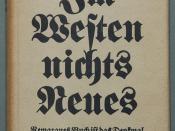
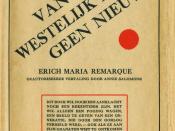
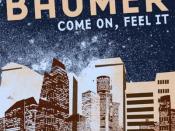

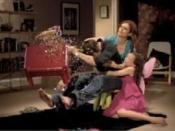
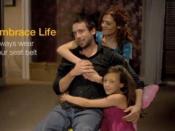
Niiceee
i agree with the language techniques he used and the different themes of war that the author of this article expressed
0 out of 0 people found this comment useful.